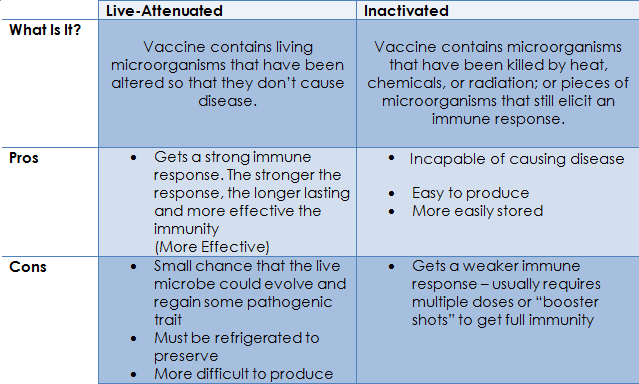FA16 Immunization Module’s Updates
Immunization of Immunosuppressed Patients
Vaccinations are used to keep not only individuals but also the community as whole safe. The majority of patients who are vaccinated are generally healthy and the vaccination is to prevent them from being severely affected by the disease. However, it’s important to look at what to do when a person who is already immune-compromised needs to be protected from further damage. When looking at immune-compromised patients there are three subcategories to consider:
Sever Immune compromisation not based on HIV
Immune compromisation of a person with HIV
Limited immune deficiency that is caused by a condition that requires the use of a special or higher dose vaccinations but the condition does not contraindicate the use of any specific vaccine
These categories are important because the vaccine type and effectiveness relies heavily on the level of immune compromisation that the patient has. When considering vaccination of these patients it takes careful consideration from the physician and extensive research. Typically with immune compromised patients inactivated vaccines are an option. The main benefit of these vaccines is that they present less of a risk to immune deficient patients because they do not have the ability to cause disease. However, the draw backs of these vaccines are that they are less effective, take 3-5 doses in order to become functioning and eventually the process will need to be repeated due to the fact that the titers weaken overtime. Lastly in permanent immune system deficiencies the use of immunization by inactivated vaccines becomes a damaging option and immunization by immunoglobulin could be a beneficial course of action.
1) www.cdc.gov/mmwr/preview/mmwrhtml/00023141.htm
2) papercutsandpathogens.wordpress.com/2012/06/06/everything-you-need-to-know-about-vaccines/



@ Nicholas Romito From what I gathered in the research vaccinations are used to prevent people from becoming sick by a particular disease, and once immunized they make antibodies and other immunologically active cells to combat the non threatening infection, even in immune- compromised patients(patients with a less effective, but functioning immune system), while their ability to fight off infection is low, which is why they require inactivated vaccines, they do have some abilities to make some antibodies. A patient in a permanent state of immune deficiency (which I probably should have stated as lack of immune system function completely) are not able make any antibodies at all, leaving them vulnerable. Immunoglobulins are antibodies and by using this method, it would be giving patients with a complete inability to make antibodies on their own, access to antibodies.
In your last statement you mentioned in permanent immune system deficiencies the use of immunization by inactivated vaccines becomes a damaging option.
I could see how activated vaccines become a damaging option because the microbe could evolve and proliferate in a immunocomprimized individual. But why would inactivated vaccines become a damaging option if there is no risk of the microbe actually infecting the person?